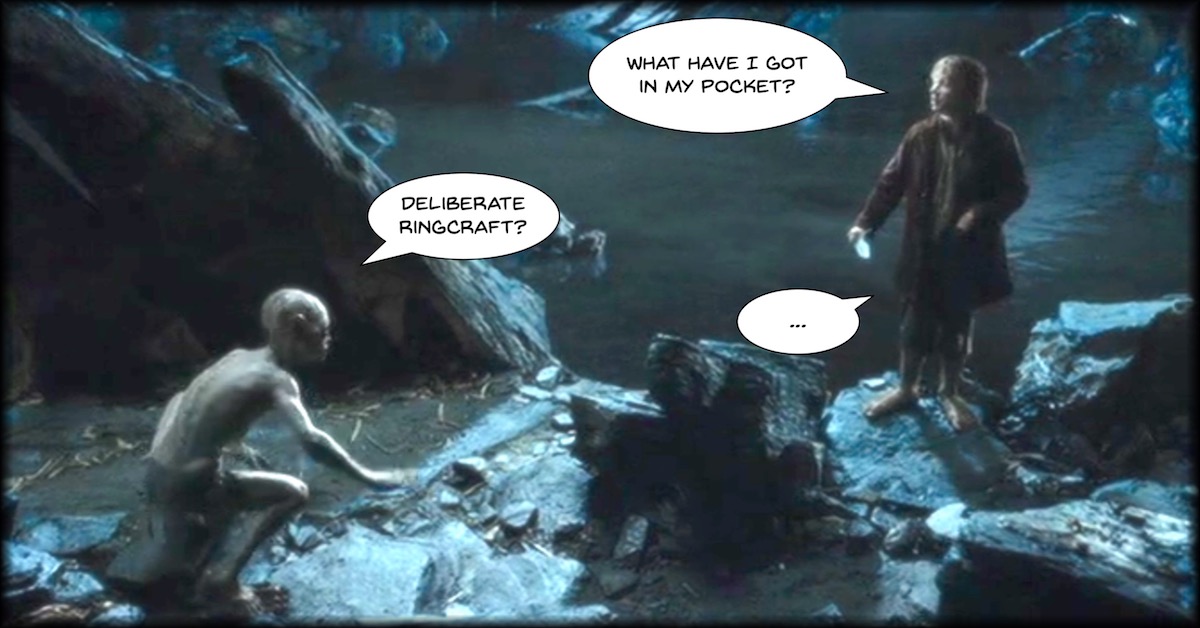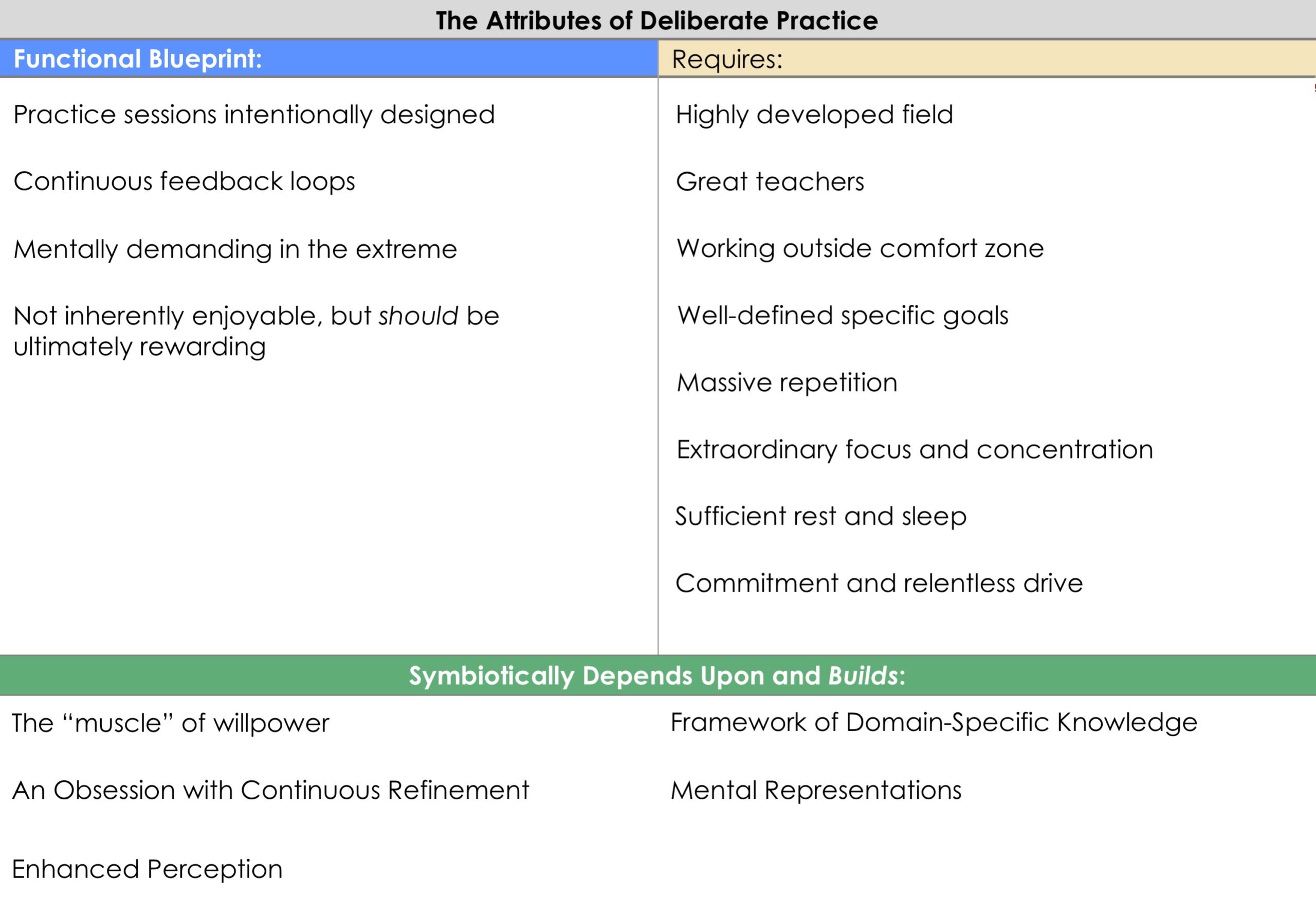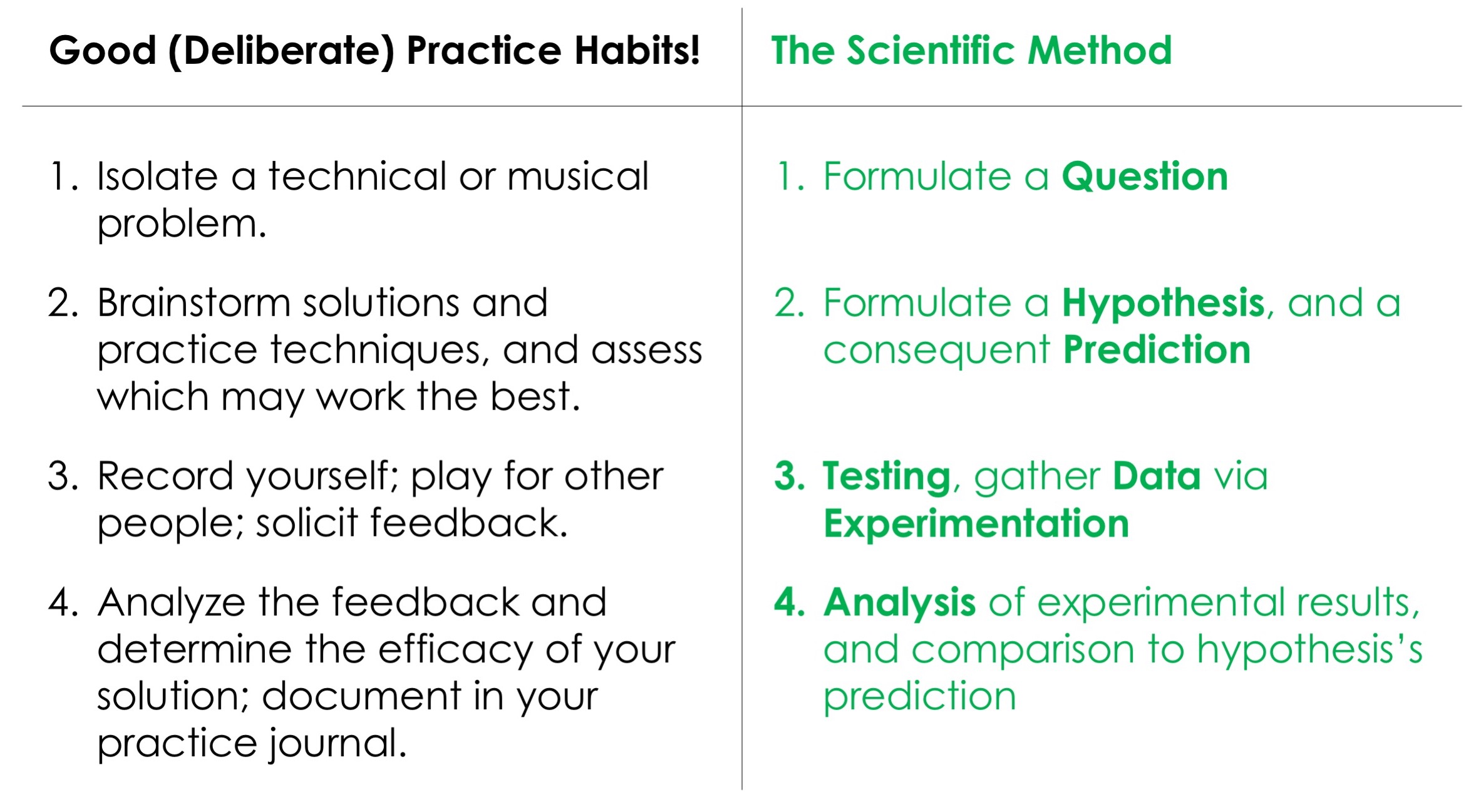(The Attributes of Deliberate Practice Epilogue)

Among filmmakers, novelists, playwrights, and opera composers, there’s a term for when the audience knows something a character doesn’t: dramatic irony. Horror movies employ a classic form of this when a naive character walks down a dark hallway as the camera reveals the slasher just around the corner. Mozart’s Così fan tutte is built upon a foundation of dramatic irony, with Guglielmo and Ferrando donning (usually not very convincing!) disguises and switching roles in order to seduce each others’ fiancées.
There’s another sort of meta-dramatic-irony that occurs when the audience knows something not necessarily because it’s already been revealed in Act 1, but rather because the whole work is already so widely known that its plotlines have become ubiquitous. When Qui-Gon Jinn first sees the young blond boy hustling into Watto’s mechanic shop around the 32-minute mark of The Phantom Menace, virtually every single person sitting in the theater for the May 16th 1999 premier was thinking, “Oh SNAP! That little kid is gonna become DARTH VADER!!!”
I similarly enjoyed the way Peter Jackson shot the iconic scene in The Hobbit: An Unexpected Journey when Bilbo Baggins accidentally discovers Gollum’s ring — the dramatic irony is thicker than the air in the depths of the mines of Moria! Bilbo has become separated from his 13 dwarven companions, having been knocked unconscious in the process. Then he groggily wakes up to Gollum finishing off a goblin:
.
In the book The Hobbit, the chapter is entitled “Riddles in the Dark,” and readers back in 1937 legitimately had no idea what was coming. (Neither did Tolkien himself, for what it’s worth; “Fellowship” wouldn’t be published for another 17 years!) But by the time of The Hobbit’s 2012 theatrical release, the Lord of the Rings universe had become so well-known that only a small fraction of moviegoers viewed that scene and thought “I wonder what that ring is?” Everyone else of course was thinking, “OMG…this is it! This is THE moment — the thing that kicks off the main events of an entire trilogy: Bilbo accidentally acquires Sauron’s One Ring of Power!” And just in case there was any doubt, composer Howard Shore employs leitmotif that hearkens back to the “Ring menace” theme of the original trilogy:

Encountering Gollum, Bilbo next agrees to a riddle contest: if Bilbo wins, Gollum will show him the way to safety. If Bilbo loses, the implications are dire. Thus he becomes increasingly panicked as the contest proceeds, asking finally:
.
“What have I got in my pocket?” indeed. This is the riddle. Gollum definitely doesn’t know. Bilbo doesn’t even really know. But we sure do….
Skillful filmmakers, novelists et al. know how to play with dramatic irony’s tension, and weave it into the narrative and scene progression in order to maximize drama. I am not a skillful filmmaker or novelist, and I’ll try to leave my drama-maximizing to operatic timpani. But there has been a riddle lurking beneath the surface of my previous posts — something I’ve kept in my pocket. It’s an insight that, once you know it, you’ll never unknow it…and every time you subsequently encounter deliberate practice material, you’ll feel like an audience member who knows a secret the characters haven’t yet figured out.
Like Gollum’s ring, it is “such a little thing”…but it is capable of wielding immense power. For centuries of our IRL human history, it has been buried in darkness, just waiting to be unearthed and illuminated and unleashed.
You want to know that secret? I’ll bet you do….
Riddles In The Dark
In my role as a teacher, part of my mission is to provide some small measure of illumination wherever and whenever I can, shedding light on the seemingly-murky subterranean terrain of practice-fueled performance. In my initial attempt at light-shedding, I entitled my first blog post “How Did a Scientist Become Principal Timpanist of the MET Orchestra?” Therein, I gave the answer: deliberate practice.
Fair enough, but that setup a bit of a riddle…what is deliberate practice? Zooming back far enough, deliberate practice turns out to be a shockingly simple concept, as I’ll reveal below. But actually implementing effective deliberate practice is difficult. So I decided to outline deliberate practice as a recipe…
 .
.
…identifying its most essential attributes, and then exploring each in turn. Over time, this became what I’ve been considering my “Deliberate Practice Series” — a set of sequential articles available to anyone who is serious about getting really good at anything. Here they are all in one place:
Since music performance is a major domain of my expertise, I explored the attributes above with relevant examples and stories from my own path through music. Admittedly, it’s been unorthodox. In that first blog post, I wrote:
“I was senior scientist at a nanotechnology company in Chicago for 10 years, and now I’m a tenured member of the great MET Orchestra…. [But] the incredible privilege I enjoy as principal timpanist with the MET Orchestra is just the ‘successful tip’ of my massive iceberg of failure…. I think of myself as a tenacious loser.”
Granted, my career transition was unusual enough to catch NPR’s attention, but attracting attention for an unordinary accomplishment was never my goal. No — in that first blog post, I left something very significant implied but unstated. This unstated thing was the true goal of that first post, and all subsequent posts. Let me make it explicit now:
I won one of the biggest music performance jobs in the world. I never went to a major music school. I don’t even have a graduate degree in music. And I was demonstrably NOT born talented. This should tell you something pretty important: it wasn’t about my DNA, it was about my process. And this is a process you can replicate.
These blog posts are about clarifying my process of deliberate practice so that you can reproduce it on your own. (And, hopefully, improve upon it…since it is only through creativity and experimentation that training methods in all disciplines improve over time.) I still adamantly maintain the importance of detaching from outcomes and focusing on process; please don’t misunderstand me to be saying “If you follow my recipe, you’ll win a job in a major orchestra.” Absolutely not. No one can promise you that…and if they do, they’re lying or trying to sell you something. With sufficient deliberate practice, anyone can become much better at nearly anything. With overwhelming amounts of deliberate practice, one can achieve expert-level performance in a field. But — and this is critical — does that guarantee “success?” Absolutely not. “Success” is a loaded term, and a concept intimately connected with outcomes that we cannot fully control. In my first post, I addressed this by encouraging aspiring musicians to focus on process rather than outcomes. Do it for the love of refining your craft, not for the goal of “winning that big job.” Because here’s the reality: there are so many extremely accomplished musicians out there that “winning that big job” is not something you can fully count on. With enough deliberate practice, your odds will definitely improve. And for those who sustainably set themselves up for the long game, your odds will improve dramatically. In that same post, I noted “my efforts did not have an expiration date” and “I will do this for as long as it takes”; this gave me confidence and poise, especially as I continued advancing at auditions. I could not be assured that I was going to win one, but I began to understand that it was just about accumulating enough “shots on goal” playing in finals. My process was under my control, and I just needed to keep getting to that final round until the stars aligned…. But my odds never hit 100%. Nor will yours. So there’s a big difference between “expert-level performance” and “guaranteed success.”
However, I also adamantly maintain this: if you invest in a good process for a long time, good things will usually happen as a byproduct. Your process is under your control, and that agency can fuel you with purpose when you’re in it for the right reasons. Imagine yourself in a future where you haven’t yet “made it” according to your definition of “success” — will it have been worth it? Will it have been fulfilling? Will all of that deliberate practice investment have been rewarding on its own terms? Will your life have been enriched as a result of your efforts, regardless of the outcome?
In many respects, I faced an uphill battle auditioning for major orchestras: I had a comparatively late start, I didn’t receive focused orchestral performance training at a conservatory, and I had a full time engineering job occupying a huge amount of my time. And yet, I now realize that I also possessed a major advantage; I didn’t know it back then but, like Bilbo’s ring, it was accompanying me the whole time as an incredibly powerful asset. My advantage was the very same as the answer to the overall “riddle” of deliberate practice.
Taken together, my deliberate practice series is basically my initial thesis statement on deliberate practice, what it is, and how it got me from scientist to Met-timpanist. I consider this current post the epilogue to that series, wrapping up these concepts and answering that riddle in one clean sentence. What is that sentence?
Answering the Riddle: You Don’t Have to be a Scientist to be “Scientific”
Those preceding twelve posts comprise 35,190 words…and that’s nearly a book! So let me save you a little time in case you just want the summary: one could compress all of those ideas into a practice room workflow that looks like this:
- Isolate a technical or musical problem.
- Brainstorm solutions and practice techniques, and assess which may work the best.
- Record yourself; play for other people; solicit feedback.
- Analyze the feedback and determine the efficacy of your solution; document in your practice journal.
There’s certainly a lot more to it, but at least this highly simplified recipe should be universally acceptable; in seven years of teaching and giving masterclasses around the world, I have yet to encounter anyone lodging a substantive protest or naysaying that “those are bad practice habits.”
Okay, so now let’s compare that simplified recipe of “Good (Deliberate) Practice Habits” to another famous workflow:

Side by side, these workflows are virtually identical. So here’s the secret to that riddle in one sentence: in its most basic form, deliberate practice is just the scientific method applied to music.
“What?!”
To repeat:

“…”
“…”
“Whoa.”

That’s right: everything you need to know about practicing you learned in 6th grade science class.
Well, okay…not everything. Here’s the requisite caveat: aesthetics are non-empirical. The emotional experience of the human condition is at the core of most major works of any kind of art, and this obviously cannot be reduced to a formula. (Vulcans are notoriously bad musicians.) What you have to say as a performing musician has everything to do with your artistic vision — i.e., your mental representations. But how you say it? That is your craft. And the refinement of your craft is absolutely ripe for the application of the scientific method.
By analogy, history’s great orators had profound things to say. (That’s the vision.) But how they said it — the coherent delivery of the message — often matters just as much…and sometimes even more. Imagine King’s iconic “I have a dream” speech, but mumbled at a monotone. Imagine hearing Kennedy’s “Ask not what your country can do for you” inaugural address over a crappy cell phone connection, with low fidelity, garbled text, and entire words dropping out. Or picture being at the 2004 DNC and witnessing then-Senator Obama stammer over “there’s not a liberal America and a conservative America — there’s the United States of America” like a nervous Bob Newhart. It’s just not quite the same effect, is it?
As performing musicians, we all know this intuitively…but it’s easy to misplace priorities. Your musical ideas need to be heard and felt. They need to be coherent. They need to be intelligible. And that can’t happen if your technique is sloppy, or you’re out of tune, or your rhythms are imprecise. Visual artists like da Vinci honed their craft so that they could create compelling pictures; if you can’t draw a straight line or a smooth curve, you cannot create the Vitruvian Man:

Thus, one of my major advantages in the process of auditioning was that, counterintuitively, it was my training in science that best prepared me for the rigors of orchestral auditions. Since deliberate practice is just applying the scientific method to the process of improving in music, my science training predisposed me to implement deliberate practice quickly and effectively. This super-charged my process, and dramatically improved my trajectory. For me, this was revelatory. It was nothing short of a complete paradigm shift.
Be Part of the Paradigm Shift
The performing arts have been a little bit late to the party when it comes to the paradigm shift of disregarding “innate talent” and refocusing on deliberate practice. Billy Beane figured it out for baseball in the early 1990s, as documented in Michael Lewis’s Moneyball; now virtually every major sports franchise includes some version of sabermetrics in their scouting, training, and managing. Over-the-top testosterone-laden Bruckheimer-blockbuster aside, the U.S. Navy’s actual “Top Gun” program is a literal case study in deliberate practice for fighter pilots (see Peak p.115). Nate Silver figured it out for election forecasting back in 2008. Chess grandmasters have been training according to deliberate practice for decades. So have Olympic athletes. And certainly, many musicians have too…just without formally recognizing it as such. The tenets of deliberate practice do not yet inform the curriculum and training most instrumental performance majors encounter…but they should. And that’s starting to change. The old false notion of “innate talent” is crumbling more and more everyday, freeing people to set their own potential rather than feel shackled by it. The types of young musicians I encounter when coaching the National Youth Orchestra are savvier and more sophisticated than ever, eminently receptive to these concepts of deliberate practice. I believe we are on the cusp of a major transformation in how young musicians train for careers in performance. So, while the wider world might feel like a bit of a dumpster fire right now… …it is nevertheless an extremely exciting time to be teaching music performance. We’re only just beginning to see the strides possible when the scientific method is applied to the craft of music-making via deliberate practice.
…it is nevertheless an extremely exciting time to be teaching music performance. We’re only just beginning to see the strides possible when the scientific method is applied to the craft of music-making via deliberate practice.
As I wrote above, the collection of these 13 posts are my initial thesis statement — the foundation for how I’ve approached practicing, with principles based in decades of research. I would categorize it as “generally prescriptive, but tailorable.” Because beyond the foundation, we can start entering the realm of “individualized anecdotes.” I plan to write a lot more about “what’s worked well for me,” exploring ideas for how to specifically apply deliberate practice in real, tangible ways. In doing so, I’ll try to tie those tangible implementations back to the core principles from my “deliberate practice series.” But as noted, the revolution is far from complete…it’s really just beginning! And so the further we get into the minutiae of practice methods, the further we’ll find ourselves from a research-based consensus. I intend to write from the perspective of providing a broad menu of options for you to try, knowing full well that it might not work for you individually…and that’s okay. There are a lot of different routes up this mountain, and many different ways to successfully employ a process of deliberate practice. (I’m very curious to know what’s working for you…so please feel free to contribute this in the comments.)
Finally, I still very much remember what it felt like to start up the mountain path myself. It was 2007, and I was only beginning to understand how far I had to go. My progress to that point wasn’t nothing, but man did I have a lot I needed to improve. At times, it could feel truly overwhelming.
But as the plucky Veronica Mars says, constantly getting knocked down, but persistently doing the work anyway: “This is where I belong, in the fight. It’s who I am.”
Or more mathematically, I’ve encountered this highly apt meme:

Every hike up a mountain begins with that first step. It’s a quote commonly misattributed to Tolkien (which is actually an old Mexican proverb), but nevertheless: “Little by little, one travels far.” My first blog post was April 26th, 2017; if you had told me then that I was going to subsequently write over 35,190 words about deliberate practice, I would have been utterly paralyzed. Instead, I thought to myself “well…I should start somewhere, and wherever I begin is where I will have started, and that will be good enough.”
![]()
